Portugal D7 Passive Income Visa for U.S. Citizens
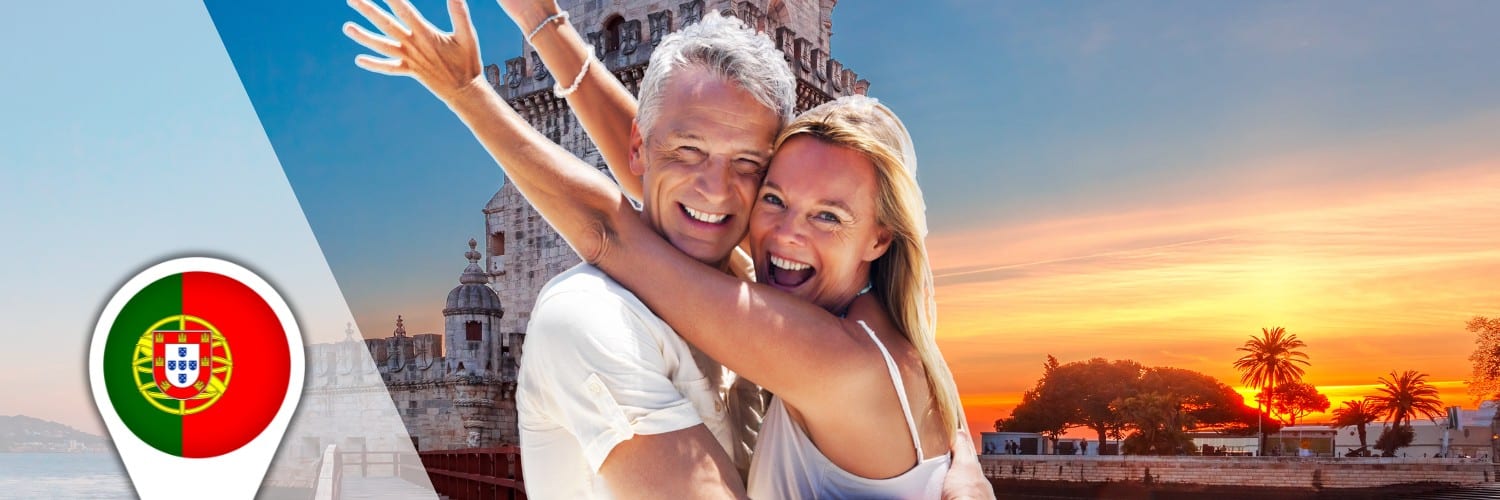
In recent years, relocating to Portugal has become an increasingly popular choice among US citizens. The D7 Visa, often referred to as the Retirement Visa or Passive Income Visa, is one of the most accessible pathways to relocating to Portugal, particularly for those with a reliable source of passive income.
This article will guide you through everything you need to know about qualifying for the Portuguese D7 Visa. From understanding the requirements and navigating the application process to maintaining your visa, we provide detailed information to help you every step of the way in your journey to relocate to Portugal.
Who Is the Portugal D7 Visa Best For?
The Portugal D7 Passive Income Visa is designed for non-EU, non-EEA, and non-Swiss citizens who can show a steady flow of passive income and want to establish legal residency in Portugal. It is especially popular among U.S. retirees with pensions, as well as individuals earning reliable income from investments or rental properties. In short, the D7 Visa is intended for those who can financially support themselves in Portugal without relying on active employment.
What Counts as Passive Income for the D7 Visa?
- Retirement funds or pension payments.
- Rental income from property in the U.S. or abroad.
- Royalties from creative or intellectual property.
- Dividends from investments when you are not employed by the company.
- Earnings from fixed-rate financial products or long-term savings.
- Interest from bank accounts or transferable securities.
What Does Not Qualify as Passive Income?
- Salaries from traditional employment.
- Income from freelancing or remote work contracts.
Because pension income is fully eligible, the D7 is also frequently called the Portugal Retirement Visa, making it a strong option for Americans planning to retire in Portugal.
Portugal D7 Visa Lawyer?
We Can Help!
#1 Contact us to get a free quote, or
#2 Schedule a Consultation now.
Applying for the D7 Visa: A Guide for US Citizens
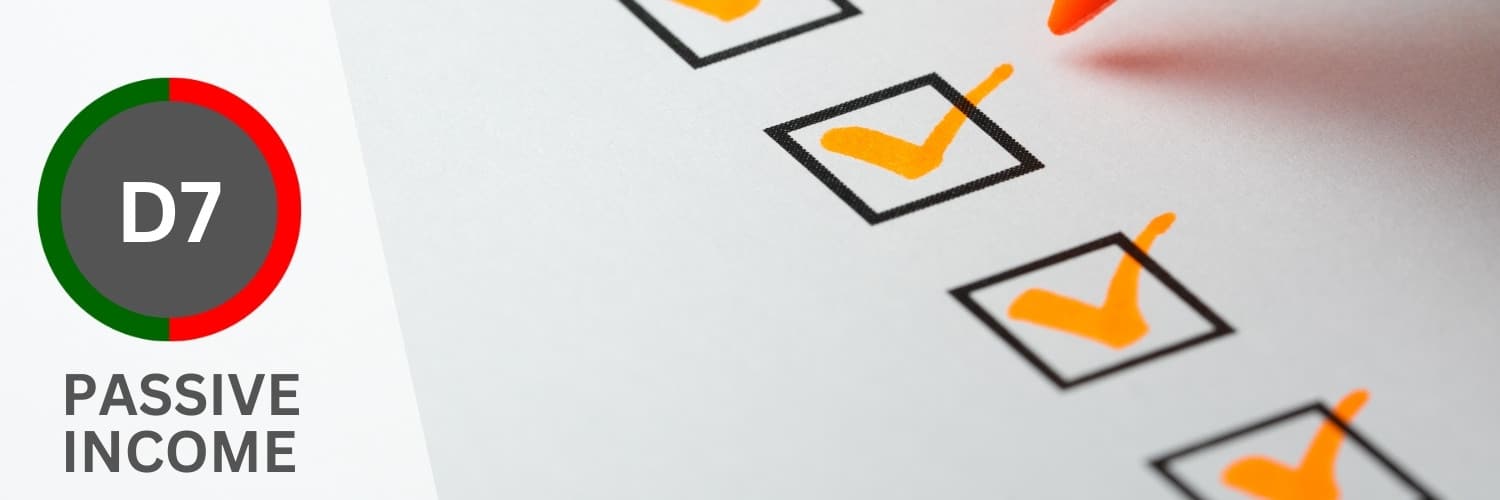
Applying for the Portugal D7 Passive Income Visa involves meeting specific requirements. Our law office guides U.S. applicants through every step, ensuring documents are correct and consular submissions are accepted the first time.
1. Proof of Passive Income
You must prove that you have sufficient passive income to live in Portugal. For 2025, the minimum is €10,440 per year for the main applicant (plus 50% for a spouse and 30% per dependent). Qualifying income includes pensions, rental income, dividends, royalties, and long-term investments.
👉 How we help: We review your income sources, calculate eligibility in line with current Portugal D7 visa income requirements, and prepare the documentation consulates expect. If income streams are variable, we help assemble additional supporting evidence to strengthen the case.
2. Proof of Accommodation in Portugal
Applicants must show evidence of housing, such as a rental contract, property deed, or formal invitation letter from a host. Some consulates prefer a long-term lease.
👉 How we help: We advise on the accommodation standard your jurisdiction requires, draft compliant lease wording, and connect clients with reputable relocation partners when needed.
3. Clean Criminal Record
You will need an FBI background check (with apostille) or the equivalent from your home country. Portuguese authorities expect a certificate showing no serious convictions.
👉 How we help: We guide U.S. citizens through obtaining, apostilling, and translating the FBI report so it is fully accepted by the consulate and later by AIMA (the Portuguese immigration authority).
4. Health Insurance Coverage
Private health insurance valid in Portugal is mandatory until you are registered with the National Health Service (SNS). Coverage must include at least basic medical and hospital care.
👉 How we help: We connect applicants with affordable insurance plans accepted by Portuguese consulates and ensure policy wording meets Portugal D7 visa insurance requirements.
5. Portuguese Bank Account
Opening a bank account in Portugal demonstrates financial stability and simplifies life once you arrive. Many consulates now expect applicants to show a Portuguese account funded with several months of living expenses.
👉 How we help: We open Portuguese bank accounts on behalf of our clients remotely, saving them the need to travel in advance. This service also ensures funds are in place before your VFS appointment.
6. NIF (Número de Identificação Fiscal)
The Portuguese NIF (tax number) is essential for nearly every legal or financial step in Portugal—from opening a bank account to signing a rental lease.
👉 How we help: We secure your NIF on your behalf quickly and efficiently. This not only saves you long waits but also ensures you have the document ready when consulates request it.
Portugal D7 Visa Application Process (Step by Step)
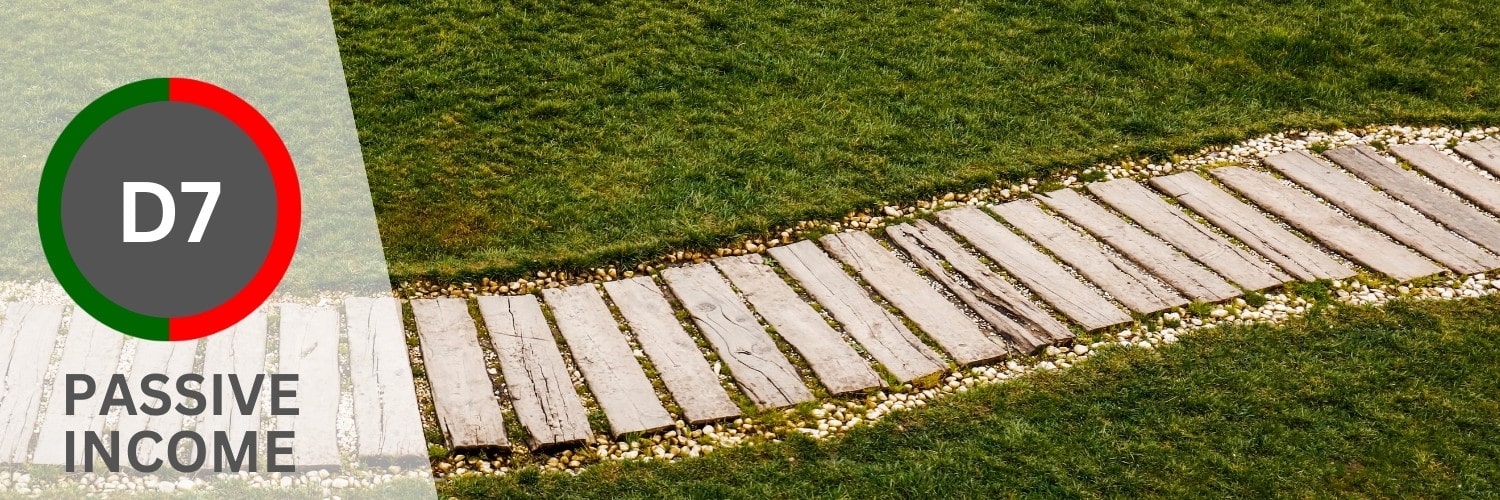
Applying for the Portugal D7 Passive Income Visa requires careful preparation and compliance with consular rules. Below is an overview of the process and how our office supports U.S. citizens throughout each stage.
1. Preparing Documentation
Applicants must gather the required documents, including proof of passive income, proof of accommodation in Portugal, private health insurance valid in Portugal, an FBI background check with apostille, and other supporting records.
👉 How we help: We provide a complete D7 visa document checklist tailored to your VFS jurisdiction, review all paperwork for compliance, and assist with certified translations where required.
2. Submitting the D7 Visa Application in the U.S.
In the United States, applications are submitted through VFS Global, which acts on behalf of the Portuguese consulates. An in-person appointment is usually required, during which you may be asked about your motivation for moving to Portugal and how your income meets the D7 visa income requirements.
👉 How we help: We book your VFS appointment, prepare you for the interview questions, and make sure your file matches the consulate’s expectations, reducing the risk of delays or rejections.
3. Waiting for Consular Approval
After submission, the Portuguese consulate reviews your case. Processing times for the D7 visa can range from 60 days to several months depending on the jurisdiction and workload. Once approved, you will receive a temporary D-type visa (valid for 120 days) that allows you to travel to Portugal.
👉 How we help: We track your application status, follow up with VFS and the consulate when needed, and keep you updated so you know what to expect while waiting.
4. Entering Portugal and Applying for Residency
Upon arrival in Portugal, you must schedule a biometrics appointment with AIMA (Agência para a Integração, Migrações e Asilo), the authority that replaced SEF. This step converts your temporary visa into a residence permit.
👉 How we help: We secure your AIMA appointment, prepare the required documentation, and accompany you (if desired) to ensure the process goes smoothly.
5. Receiving Your Residence Permit
The initial D7 residence permit is now valid for two years (not one, as it was in the past). It can then be renewed for an additional three years. After five years of legal residency, you may apply for permanent residency or Portuguese citizenship.
👉 How we help: We manage your renewals, track deadlines, and guide you through the long-term path toward Portugal permanent residence or citizenship.
Portugal Passive Income Visa?
We Can Help!
#1 Contact us to get a free quote, or
#2 Schedule a Consultation now.
Maintaining and Renewing the D7 Visa
Holding a Portugal D7 Passive Income Visa comes with ongoing responsibilities. By meeting these requirements and keeping your documentation in order, you secure the right to remain in Portugal and eventually qualify for permanent residency or citizenship.
1. Residence Requirements
To maintain your status, you must not be absent from Portugal for more than six consecutive months or eight non-consecutive months during each residence permit period. While many applicants naturally spend more than 183 days in Portugal (becoming tax residents), immigration law is based on absence limits.
👉 How we help: We clarify the difference between Portugal immigration rules vs. tax residency rules and connect you with trusted tax professionals so you remain compliant in both Portugal and the U.S.
2. Maintaining Passive Income
You must continue to meet the Portugal D7 visa income requirements throughout your residency. Income from pensions, rentals, dividends, or investments must remain stable and at or above the required thresholds.
👉 How we help: We review your updated income proofs before renewals and advise on combining multiple income sources so your financial file stays strong.
3. Renewing Your Residence Permit
The initial D7 residence permit is valid for two years, followed by a three-year renewal. At each renewal stage, you must provide updated documents, including proof of accommodation, passive income, valid private health insurance, and your Portuguese tax number (NIF).
👉 How we help: We prepare your D7 visa renewal application, schedule your AIMA appointment, and ensure that all documents meet current standards so renewals are granted smoothly.
4. Path to Permanent Residency or Citizenship
After five years of legal residency in Portugal, D7 visa holders may apply for permanent residence or even Portuguese citizenship. To qualify, you must demonstrate basic knowledge of the Portuguese language (A2 level) and show integration into the community. Citizenship also grants the right to an EU passport, offering visa-free travel across Europe.
👉 How we help: We guide you through the Portuguese citizenship application process, connect you with language exam resources, and ensure your residency history is properly documented for submission.
Portuguese Bank Account for D7 Visa?
We Can Help!
#1 Contact us to get a free quote, or
#2 Schedule a Consultation now.
Benefits of the Portugal D7 Visa
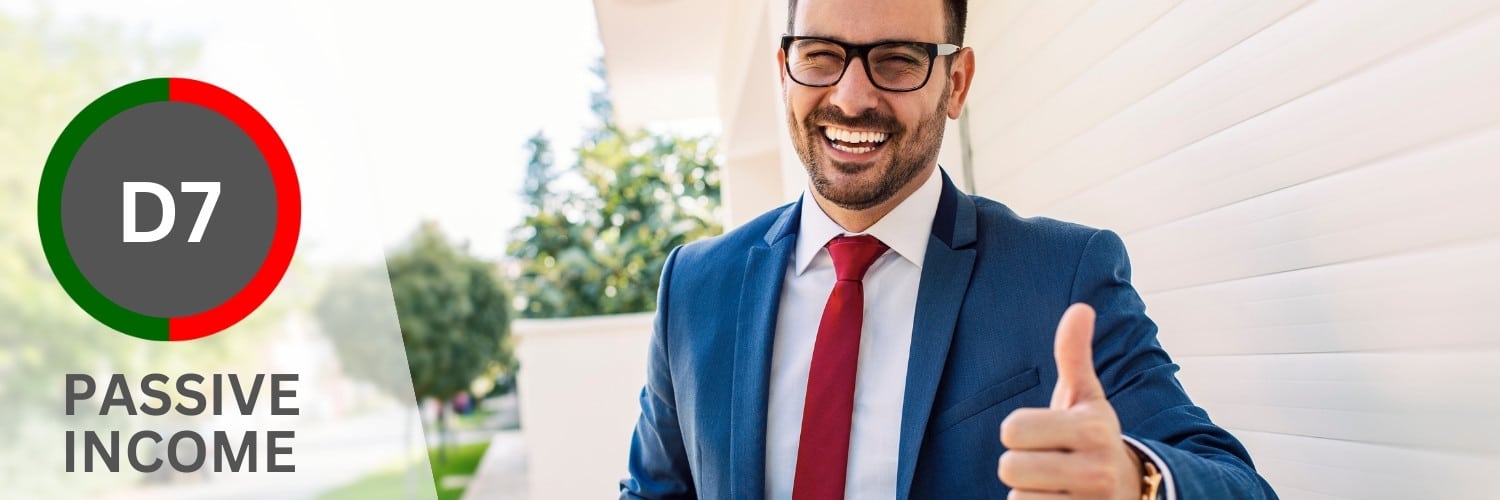
The Portugal D7 Passive Income Visa offers wide-ranging advantages, making it one of the most popular residency options for U.S. citizens seeking a new life in Europe. Below are the main benefits and how we support our clients in maximizing them.
1. Access to Healthcare in Portugal
D7 visa holders can enroll in the Portuguese National Health Service (SNS), receiving high-quality medical care at significantly reduced costs. Many applicants also keep private coverage for additional peace of mind.
2. Path to Portuguese Citizenship and EU Passport
After five years of legal residency, D7 visa holders may apply for permanent residence or Portuguese citizenship, which grants an EU passport with visa-free travel to over 180 countries.
3. Family Reunification Rights
The D7 visa allows for family reunification in Portugal. Spouses, dependent children, and even dependent parents can join the primary applicant and obtain their own residence permits.
👉 How we help: We handle family reunification applications, prepare dependent income documentation, and schedule group appointments so your loved ones move with you seamlessly.
4. Favorable Tax Options for New Residents
While the Non-Habitual Resident (NHR) regime closed to new applicants in 2024, some Americans may still benefit from transitional rules. From 2025 forward, the IFICI tax incentive program applies to certain qualifying residents, particularly professionals in research and innovation. Even without NHR, Portugal’s double-tax treaties and moderate tax rates remain advantageous.
5. Visa-Free Travel in Europe
With the Portugal D7 residence permit, you can travel freely throughout the Schengen Area, covering 26 European countries, without the need for extra visas or border checks.
6. High Quality of Life in Portugal
Beyond the legal and tax benefits, Portugal is consistently ranked as one of the best countries for expats due to its affordable cost of living, Mediterranean climate, safety, rich history, and welcoming culture. Many Americans choose the D7 Visa specifically to enjoy a relaxed lifestyle while retaining easy access to the U.S. and Europe.
D7 Visa Processing in the US?
We Can Help!
#1 Contact us to get a free quote, or
#2 Schedule a Consultation now.
Challenges and Considerations
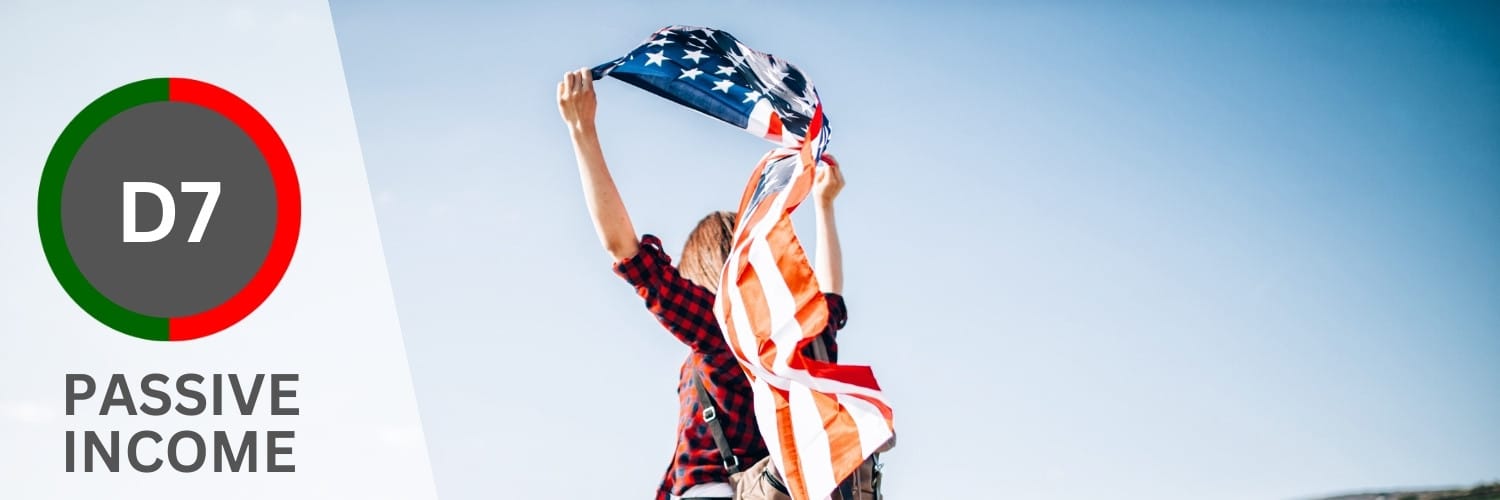
While the D7 Visa presents many advantages, there are also significant challenges and considerations to keep in mind:
Language Barrier: Learning Portuguese can significantly enhance your experience and integration into the local community. Although many Portuguese people speak English, particularly in urban areas, knowing the local language can make daily life easier and more enjoyable.
Cost of Living: It’s essential to consider the cost of living, as it can vary significantly depending on the region. Major cities like Lisbon and Porto tend to be more expensive, while smaller towns and rural areas offer a more affordable lifestyle. Read our article on the cost of living in Portugal to gain an understanding of what to expect.
Cultural Adjustment: Adapting to a new culture and lifestyle can be challenging but also rewarding. Engaging with local customs and traditions can greatly enrich your experience, allowing you to build meaningful connections within the community.
Bureaucratic Processes: Navigating the bureaucratic processes in Portugal can be complex and time-consuming. Professional counsel both in the US and Portugal can assist you in navigating the complexities of the move and maximizing the benefits of your new life in Portugal.
No access to the marketplace: under this visa, you cannot work for a company in Portugal. However, you can work remotely for an employer abroad as a digital nomad.
All You Need to Know about Portugal
Don’t forget to check our Guide for US Citizens considering relocation to Portugal.
Portugal Residency Via Passive Income?
We Can Help!
#1 Contact us to get a free quote, or
#2 Schedule a Consultation now.
Passive Income Visa (D7 Visa) Youtube Videos
1. HOW TO QUALIFY for Portugal’s D7 Retirement Visa
2. How Much Savings Do You Need for the Portugal Passive Income Visa (D7 Visa)?
NIF for D7 Visa in Portugal?
We Can Help!
#1 Contact us to get a free quote, or
#2 Schedule a Consultation now.
Frequent Questions

1. What is the D7 Visa?
The D7 Visa, also known as the Retirement Visa or Passive Income Visa, allows non-EU/EEA/Swiss citizens with a reliable source of passive income to reside in Portugal.
2. Who is eligible for the D7 Visa?
Non-EU/EEA/Swiss citizens who can demonstrate sufficient passive income to support themselves in Portugal are eligible.
3. What types of income qualify as passive income for the D7 Visa?
Qualified passive income includes pensions, rental income, interest from savings, dividends, royalties, and earnings from long-term investments.
4. What is the minimum income requirement for the D7 Visa?
As of 2024, the minimum income requirement is approximately $9,210 per year for the primary applicant, with additional amounts for dependents.
5. How do I prove my passive income for the D7 Visa application?
You must provide documentation such as bank statements, pension statements, or investment account statements.
6. What accommodation proof is required for the D7 Visa?
You need to provide a rental agreement, property deed, or a letter of invitation from a host in Portugal.
7. Do I need a clean criminal record for the D7 Visa?
Yes, you must provide a certificate showing no criminal convictions from your home country.
8. Is health insurance mandatory for the D7 Visa?
Yes, you must have private health insurance valid in Portugal until you are registered with the Portuguese National Health Service (SNS).
9. Do I need to open a Portuguese bank account?
While not mandatory, opening a Portuguese bank account is highly recommended to demonstrate financial stability and facilitate transactions.
10. What is the NIF, and do I need it for the D7 Visa?
The NIF (Número de Identificação Fiscal) is a Portuguese tax identification number required for various administrative processes, including opening a bank account and signing rental contracts.
11. Where do I submit my D7 Visa application?
You must submit your application to the nearest Portuguese consulate or embassy in the United States.
12. What is the processing time for the D7 Visa?
The processing time can vary, typically taking several months.
13. What happens after my D7 Visa is approved?
You will receive a temporary visa to enter Portugal. Upon arrival, you must schedule an appointment with the Agency for Integration, Migration, and Asylum (AIMA) to apply for a residency permit.
14. How long is the initial residency permit valid?
The initial residency permit is valid for one year.
15. How often do I need to renew my residency permit?
You need to renew your residency permit twice, with each renewal granting an additional two years of residency.
16. Can I apply for permanent residency or citizenship after the D7 Visa?
Yes, after five years of uninterrupted residency, you can apply for permanent residency or citizenship, provided you meet language and integration requirements.
17. What are the benefits of the D7 Visa?
Benefits include access to the Portuguese Health Service (SNS), family reunification, favorable tax regimes, and free circulation within the Schengen Area.
18. Are there any challenges with the D7 Visa?
Challenges include the language barrier, varying cost of living, cultural adjustment, and bureaucratic processes.
19. Can I work in Portugal with a D7 Visa?
The D7 Visa is intended for those with passive income, but you may be able to work remotely for a non-Portuguese company or engage in freelance work.
20. How can I enhance my experience and integration in Portugal?
Learning Portuguese and engaging with local customs and traditions can significantly enhance your experience and integration into the local community.
D7 Visa with Family Dependents?
We Can Help!
#1 Contact us to get a free quote, or
#2 Schedule a Consultation now.


